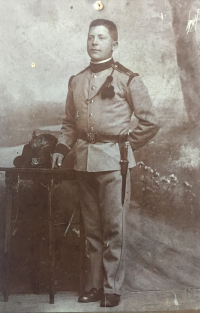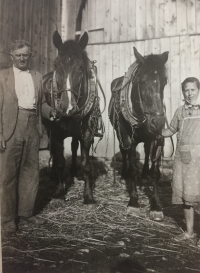Even though my dad joined the United Agricultural Cooperative, the communists evicted us anyway
Download image
Josef Kotík was born on 20 December 1945 in Bohdalec in the Bohemian-Moravian Highlands. He grew up on a farm of his parents who owned around thirty hectares of farmland. His father Rudolf Kotík worked as a village librarian for some time, he had studied at an agricultural school and from 1942 he was in charge of a family farm that had a long tradition. The United Agricultural Cooperative was founded in Bohdalec in 1951 and Rudolf Kotík joined it because he did not manage to farm on his own. Even though he gave his property to the United Agricultural Cooperative, a smear campaign against him was mounted a year later. He was later expelled from the cooperative; the returned fields were exchanged for infertile ones and by gradual blackmail, he was driven to evict. The alleged reason for the dispute was a garden next to their house. The family was evicted to Poříčí near Přibyslav where they lived in unsuitable conditions without electricity and water. Rudolf and Ludmila worked as workers at a local state farm. They had to leave the place three years later when Ludmila got ill and could no longer work. They lived in Žďár nad Sázavou with Rudolf Kotík’s sister for a similar length of time, she then had them evicted by court order. Josef Kotík could not study at secondary school because of his cadre report, and he apprenticed in the engineering company ŽĎAS, where he worked for a total of 48 years. His father Rudolf Kotík asked for rehabilitation in the second half of the 1960s, but it was denied at the time of starting normalization. He worked as a blue-collar worker and never returned to his home village. His mental state was affected by the eviction and also by the tragic death of his oldest son Miloslav. He died at eighty-six and unfortunately did not live to see the fall of the communist regime. The witness lived in Žďár nad Sázavou at the time of the recording (June 2021).

